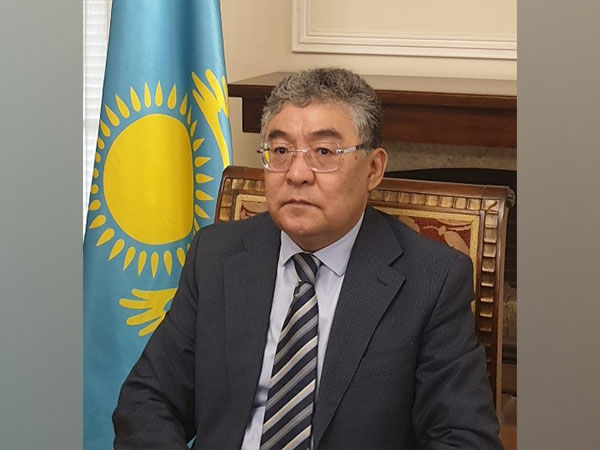Kazakhstan advances preservation efforts under its Chairmanship of International Fund for Saving Aral Sea
Highlighting the challenges and aspirations of improving the situation in the Aral Sea basin, the Chairperson of the Executive Committee of the International Fund for Saving the Aral Sea (IFAS), Askhat Orazbay said that the ecological crisis in the basin is accompanied by progressive scarcity and pollution of water resources, as well as land degradation.

- Country:
- Kazakhstan
After assuming the chairmanship of the International Fund for Saving Aral Sea for 2024-2026, Astana is increasing cooperation on the integrated use and protection of water resources, addressing environmental issues, socio-economic aspects, and introducing elements of a green economy in Central Asian countries. Highlighting the challenges and aspirations of improving the situation in the Aral Sea basin, the Chairperson of the Executive Committee of the International Fund for Saving the Aral Sea (IFAS), Askhat Orazbay said that the ecological crisis in the basin is accompanied by progressive scarcity and pollution of water resources, as well as land degradation.
Orazbay articulated the imperative of confronting the environmental degradation prevailing in the Aral Sea basin, which has endured for over three decades. "Central Asia confronts an escalating burden on its ecosystems due to rapid economic development and burgeoning population growth. Our region faces an ecological crisis exacerbated by dwindling water resources, land degradation, and the ominous expansion of the Aralkum desert," he remarked. The Aral Sea, once the world's fourth-largest lake, now stands as a stark testament to environmental mismanagement. Decades of diversion for irrigation purposes have rendered vast stretches of its seabed desolate, creating a wasteland spanning more than 54,000 square kilometres.
Despite concerted efforts, only a fraction of the Aral Sea's original expanse has been reclaimed. The rehabilitation of the Small Aral, albeit a commendable achievement, underscores the monumental task ahead. Orazbay underscored the regional collaboration imperative, emphasizing Kazakhstan's commitment to fostering integrated strategies for water resource management and sustainable development. "Our chairmanship's paramount objective is to deepen cooperation among Central Asian nations, addressing water usage, environmental preservation, and fostering a 'green' economy," he said.
Additionally, Orazbay stated regarding the plans during the period of Kazakhstan's chairmanship, "We will continue to implement two main programs approved by the IFAS Board: Aral Sea Basin Program-4 (ASBP-4) and its systematic monitoring, as well as the Regional Environmental Protection Program for the Sustainable Development of Central Asia (REPPSD CA). The period of implementation of both Programs is until 2030." "Through ASBP-4 and REPPSD CA, we endeavour to confront the ecological plight of the Aral Sea basin, propelling adaptive measures to combat climate change and preserve biodiversity," Orazbay added.
The IFAS Chairperson emphasized the need for innovative interventions, including the development of climate-resilient agricultural practices and the establishment of transboundary eco-corridors. "If we talk about new initiatives that will be carried out within the framework of Kazakhstan's chairmanship in the IFAS, then this is the creation of a long-term and sustainable regional cooperation mechanism for the effective use of water and energy resources in Central Asia, taking into account the interests of all countries in the region in the fields of irrigation, hydropower and ecology."
Systematic work is also needed to implement a unified automated system for accounting, monitoring, management and distribution of water resources in the Aral Sea basin. Kazakhstan President Kassym-Jomart Tokayev, at a meeting of the Council of Heads of States-Founders of the IFAS held on September 15, 2023, in Dushanbe, called on the parties to begin implementing these initiatives.
As Kazakhstan assumes its leadership role, collaboration with international partners and stakeholders assumes paramount significance. The alignment with global sustainability goals and adherence to environmental conventions signify Kazakhstan's commitment to regional coherence and global stewardship. "From 2024 to 2026, Kazakhstan will take measures to implement the instructions and agreements reached by the Heads of State at the IFAS Summit on September 15, 2023, in Dushanbe, as well as previously concluded agreements and commitments, which will ensure the consistency of Central Asia's actions to achieve the global SDGs and its positioning as a single region, Orazbay concluded by saying.
Notably, in modern realities, with ubiquitous population growth, rapid economic development of states, and increased water consumption per capita, the burden on the environment is steadily growing. Such an intensification of anthropogenic impact provokes and accelerates global climate change processes. In Central Asia, these processes are proceeding faster than the global average. (ANI)
(This story has not been edited by Devdiscourse staff and is auto-generated from a syndicated feed.)










